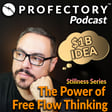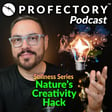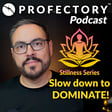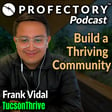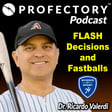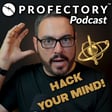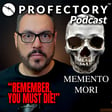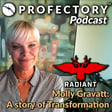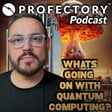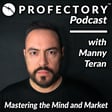Become a Creator today!Start creating today - Share your story with the world!
Start for free
00:00:00
00:00:01

The Stillness Series- Part 4: Tools to Recharge and Refocus
In this final episode of The Stillness Series, Manny Teran shares how stillness helped him through one of the hardest seasons of his life. He offers four powerful tools—solitude, nature, digital breaks, and reflection—to help you reset and sharpen your focus. These practical strategies are designed for high achievers who need to recharge without losing momentum. Stillness isn't retreat—it's preparation for your next leap.
Transcript
Introduction to the Profectory Podcast
00:00:04
Speaker
The Profectory Podcast, Mastering the Mind and Market. Hosted by Manny Turan, we explore what it takes to succeed both in business and within yourself.
00:00:15
Speaker
From a strategy and business growth to mindset and resilience, we provide the tools to lead with clarity, confidence, and wisdom.
Final Episode of Stillness Series
00:00:31
Speaker
Welcome to the ProFactory Podcast, Mastering the Mind and Market. My name is Manny Turan and I'm your host. Today is the final installment of the four part series on stillness that was really born out of necessity for me.
00:00:47
Speaker
And I wanna share this with you. When i was running my business about 10 years ago and it was coming to a crashing, fiery demise, and i was going through a divorce, and I had a lot of things in my mind, it was just a crazy time in my life, I turned to stillness.
Meditation and Yoga for Leaders
00:01:07
Speaker
I turned to meditation, I turned to yoga, and it helped me through a lot of that.
00:01:13
Speaker
Now, in in a lot of this, in this day and age, you know, as business leaders, we tend to not really look towards meditation or yoga as a solution, but I might not really challenge that.
00:01:25
Speaker
Meditation and yoga is huge. Now, the stillness series here in today's podcast, I'm going to give you four practical tools that you can use, similar to yoga, similar to meditation, to create that stillness that you need in your life to recharge your batteries, to sharpen the saw, and to give you the edge that you're looking for.
00:01:47
Speaker
The concept ah of if you're too busy to do yoga, too busy to practice stillness, too busy to do meditation is exactly when you need to do those practices.
00:01:58
Speaker
Sounds contra to what you might think logically, but I'm telling you right now from personal experience, from science that I've quoted, from the Stoics, there's so much to it that I really implore you to weave this and make this part of your life.
00:02:15
Speaker
Put it on your calendar, block it off, and you can in basically make it known to those around you that you're goingnna be practicing this because you need their support to give you that space.
Monthly Solitude Practice
00:02:28
Speaker
All right, the first practical rule is the three hour solitude rule. That means that once a month, you you will create time and space in your life so that you can sit with yourself for three hours.
00:02:44
Speaker
You can bring a journal with you, you can spend time writing down stuff, but do not bring your phone. Do not use your tablet. as a note-taking device, put it out of the room.
00:02:55
Speaker
If possible, go to nature. This is why nature is so cool, because you can get out and there's not gonna be a tremendous amount of people. But what you want is that is that time by yourself. If you have a spouse or children or an animal, kick them out of the room and and put a sign up and make sure they know that you need this time for yourself.
00:03:13
Speaker
As an entrepreneur, as a business leader, as a high achiever, this needs to be part of your regimen, no matter what. Three hours solid two. Now, I'll tell you this right now. By the first 10 minutes, you're going to be antsy.
00:03:27
Speaker
You're going to have ants in your pants. You're going to be scratching and itching to get out of that room. And I'm telling you right now, you need to actually stick with it. You can build up to it. Maybe the first time you do it, maybe you do a half an hour.
00:03:40
Speaker
Maybe the second month, you do an hour and a half. And you can eventually get to that three-hour time frame. You can also take a walk, which is something that I do, but make it so that you're not going to see anybody. You're not going to be interfacing with lots of folks. I like to go out into nature where there's nobody around.
00:03:57
Speaker
So really important. In that time when you you when you have your your pad with you, your journal, you can reflect. Thoughts that come in your mind, you can write them down.
00:04:09
Speaker
If you have something you're chewing on, some big issue, you can scratch out some ideas that come to mind. The idea here is you don't want to necessarily focus too heavily on any problem.
00:04:20
Speaker
You want to have that diffuse thinking. We talked about it in the previous episode, that free form thinking where you just let your mind wander. And you know sometimes what I used to do is I would doodle on on that journal.
00:04:33
Speaker
And that would help me, ah the focus part of my mind and then the diffuse activity would happen in the background and then I'd get that eureka moment and then I'd start writing stuff down. So first thing, three hour solitude rule.
Quarterly Day in Nature
00:04:46
Speaker
Second thing is the nature strategy day. So once a quarter, spend an entire day in nature by yourself. Yes, I know what you're thinking.
00:04:58
Speaker
It's a lot to ask. And especially if you are uncomfortable with being in nature by yourself all day long, find a way. Of course, you will need your phone, but keep it on vibrate. Keep it as an emergency thing only.
00:05:14
Speaker
Go out in nature. You can drive to these places that are away from the city and just spend time in nature. Take your feet off. Walk on the on the grass. Walk on the ground. Journal as well. Spend the time ah observing what you see around you.
00:05:28
Speaker
And this was actually an interesting idea that I got when... I was in Scouts, and we had this particular merit badge called Environmental Science. And there was a couple other ones. I can't remember off the top of my head.
00:05:42
Speaker
But the idea was we would sit out in the forest for an hour a day for about five days and just record what we saw in in that moment.
00:05:53
Speaker
We heard these birds chirping. I saw this beetle walking around. A pine cone fell. Whatever it was, and what it sort of trains you to do is it trains you to be more observant.
00:06:03
Speaker
And it trains you to really be grateful and enjoy those small things that you see. So this nature day is gonna be, needs to be told to your loved ones so that they understand that this is something that you need in order to sharpen your saw and become a higher achieving person.
00:06:21
Speaker
I guarantee right now, you're gonna get a lot from that nature day, once a quarter at least.
Digital Sabbath Concept
00:06:27
Speaker
The third thing is, this is gonna be very, very hard and I'm telling you right now, I have a hard time with it.
00:06:35
Speaker
And that is the digital Sabbath. So this is the idea that one day a week, you do not rely on your phone. You don't look at your phone.
00:06:47
Speaker
You don't spend time on social media. You don't immerse yourself in all of these things that are electronic in your day. Super hard. It's easier if you're out in nature, by the way, so you can think about that.
00:07:02
Speaker
It's easier if you're working on a project or if you're involved in some volunteering. This one you can do with other people. But the idea is you stay off your phone as much as possible. Now, the reason I say it's hard for me is because i am the CEO of an organization, I've got children, so I need to be connected at some level um during the, like every single week, it's hard for me to break free free for one entire day.
00:07:26
Speaker
But what I like to do, especially on Sundays or over the weekend is I, Almost don't look at my phone for social media. I use it for communication only. And so that could be a possible bridge for you. And you know this is a practice. This isn't perfection.
00:07:41
Speaker
So for me, it's a these things are a practice as well. So create that digital Sabbath for you. You can start with a half day if you want. Maybe Sunday morning until noon, you cannot be on your phone.
00:07:52
Speaker
And try that out. You're going to see that there's a tremendous amount of calm and focus that you'll get from it. You can read a book, you can be old school and and do things like that. You could work on a hobby, but stay away from your phone, stay away from your from your your laptop, and it's all about a digital Sabbath, so you stay away from that.
Reflection Framework and Stillness
00:08:13
Speaker
And then at the last piece of this is it really kind of ties everything together, and that's the idea of reflection framework. From those elements, from the three hour solitude rule, from the nature day and from your time without your phone, you with intent, you practice this concept of this reflection framework.
00:08:37
Speaker
And what I mean by that is there's a series of questions I have here. And that is, what am I avoiding? That's a question you need to ask yourself. This this idea, this framework could be we woven into those elements or it can be its own actual element.
00:08:53
Speaker
I like to do this sort of in the summer and in the winter timeframe. couple of times a year, I like to reflect on how I'm doing in life, how I'm doing in that particular slice of life, whether it's summertime or winter, I can look forward and look backwards and think about am i Am I on the right the right path?
00:09:12
Speaker
And so with that, what am I avoiding? What am I pretending not to know? What matters most right now? What am I spending my time on that doesn't move the needle?
00:09:22
Speaker
Who am I spending the time with that isn't bringing me advancement? Because we all have those people, those friends and family that as much as you love them, they're not moving you forward.
00:09:34
Speaker
And this is not, by the way, some judgment situation. This is just a reflection. The reflection framework is all about just looking at your life as an assessment and not as a test.
00:09:45
Speaker
Of course, tests are all, the whole idea is you're gonna get a grade, right? You're wrong and you're right. It's true or false, it's whatever. But this is not that, this is an assessment. It's like you're looking at your life with as much bias removed as possible and you're writing this down on your in your journal and this is just for your your own your eyes only, right And what it's going to do is over time, you're going to see yourself develop into a more um calm person. You're going to make decisions that are based on your guiding values and principles, which sounds sort of um kind of woo-woo, but I'm telling you right now, having this reflection time, um I like to practice it when especially...
00:10:30
Speaker
When I'm on vacation, when I'm somewhere um by the ocean, when I'm in the mountains, I think, how am I doing in life? What i what do I need to do? And I write it down. The writing it down piece is something that a lot of us fail to do. And what happens is that you you forget or it loses its power.
00:10:48
Speaker
because you just have, you hold it in your mind and then, you know, just like anything else, a few days later, you forget about it. Write it down, come back to it. Set a reminder on your calendar to come back to that reflection framework.
00:10:59
Speaker
There's a quote here by Seneca that says, he who is everywhere is nowhere. This is really has to do with intent. This has to do with if you are constantly chasing shiny objects, if you're constantly chasing chasing pleasure, if you have no regard for the future or the past, I mean, it's all about the present, of course, but you need to also honor your past and you need to be intentful on your future. So the idea here is creating this space of intent
00:11:32
Speaker
those questions, and I have a bunch more that I'd be happy to to share with you. um And the idea here is that stillness is really important to do. It's part of what I do as an entrepreneur and and my coaching clients that I have is I i bring that in to play as well.
00:11:49
Speaker
um And I've seen a lot of success by them having made this into part of their life and their spouses are thankful for it and their children are thankful for it because it gives them a certain calming energy.
00:12:03
Speaker
um So go outside, be alone, practice stillness, cultivate your practice of yoga or meditation or working out. These are all elements that are really important to create that stillness because in the end, stillness is what's going to create that momentum, pulling back just like that bow and arrow or just like that slingshot, pulling back slightly so that we can advance more quickly and with better and more efficiency.
00:12:33
Speaker
Thank you.
